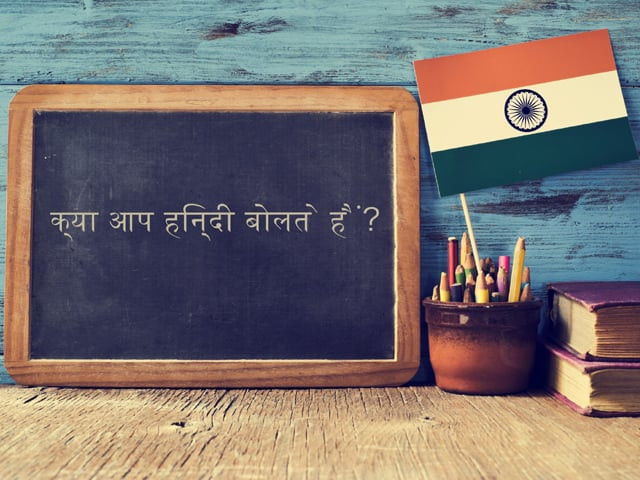Earlier this month, a very significant debate took place in the Lok Sabha of India between External Affairs Minister Sushma Swaraj and the MP from Thiruvananthapuram, Shashi Tharoor. The debate was regarding making Hindi an official language at the United Nations (UN).
Swaraj, in reply to a question on what steps the government is taking in making Hindi an official language at the UN, said the government is doing its best in creating a consensus among other countries to accept it. She said that the government of India is willing to spend not just 40 but even 400 crores in making Hindi an official language. In short, money is no bar. Tharoor referred to this as a waste of tax payer’s money and an entirely unnecessary endeavour.
Swaraj and Tharoor have a very different view of the importance of Hindi to India, which is just the latest manifestation of one of the fundamental problems that besets the polity of the Indian nation state today. While Swaraj views Hindi as the glue that will strengthen the unity of the Indian union, Tharoor views this to be an attempt at forging a unity to be misguided, if not simply counterproductive. Even 70 years after independence, India is yet to adequately address this question of language in a satisfactory manner. But in which direction do the answers lie? With Swaraj or Tharoor?
To attempt answering this question, it is important to engage with the history of the formation of the modern political Indian union, since there is a distinct history behind the formation of every nation state. Elsewhere, Tharoor has said that India is a distinct and recognisable civilisational space.
While this may be true, and while this may have facilitated the coming together of the people of India, the circumstance that precipitated this political coming together was colonialism. Our nationalism is therefore an inclusive heterogeneous nationalism. However, many of our founding fathers like Mahatma Gandhi, Jawaharlal Nehru, Vallabhbhai Patel and so on, were influenced by modular forms of western nationalism based on a single religion and language. They thus decided to give Hindi the status of being the first among equals of Indian languages in the interest of India’s unity, given the number of people who could converse in it. English was to be phased out in some time because it was the language of the coloniser while Hindi, a native language, was to take its place as the lingua franca of the Indian union.
But this was not to be. Several episodes in independent India’s history prevented this from happening. Firstly, Nehru was forced to create linguistic states when a Gandhian, Potti Sriramulu, fasted to death while demanding the creation of a state for Telugu speakers. Had linguistic states not been created, Hindi stood a better chance of being the lingua franca. The second, more compelling episode was the anti-Hindi protests in Tamil Nadu and West Bengal. If Hindi was to be the lingua franca of India, it was imperative that non-Hindi people learn the language. This amounted to an imposition and an undermining of non-Hindi language systems. This was resisted and Nehru had to concede that Hindi would not be mandatory and that English would continue to be the language of the union government along with Hindi.
Thus, while Hindi was not able to replace English in modern India, it remains, to this day, the most powerful Indian language in the Indian union. This has had many consequences.
The first is that while most parts of India underwent linguistic divisions, North India did not. While North Indian states speak a whole host of other languages apart from Hindi, barring Punjab, their governments function in Hindi. People in Uttar Pradesh (UP), Bihar, Rajasthan, Madhya Pradesh (MP) and so on, speak several languages but they all function in Hindi. When a state in a certain area does not function in the language that the people in that area speak, it exacts a huge human cost. States become inherently more inefficient in delivering goods and services. Children who do not learn in their mother tongues have poorer educational outcomes. One of the things common to the BIMARU states (an acronym for India’s laggard states of Bihar, Madhya Pradesh, Rajasthan and Uttar Pradesh) of India is that they function in Hindi while their people speak several other languages too. This could well be one of the important factors that explain why South Indian states perform better. Is it thus time to ask what cost has Hindi exacted in the states of the North where it wasn’t the lingua franca? It also poses a direct threat to other language systems since the incentive to learn Hindi is strong whereas there is no incentive to learn their mother tongues.
In the ladder of upward mobility in North India, English is at the top, followed by Hindi, followed by the local languages. This system leads to the local languages dying out because if you wish to be upwardly mobile, the incentive to learn the local language is low since the state and the market don’t function in it. Hindi is more concentrated in the urban areas of North India therefore this also exacerbates the rural-urban divide with those unable to speak Hindi frequently looked down upon just as the Anglophone elite often look down upon those who don’t know English. This pernicious system sustains different levels of encrusted elite in India. Whereas in North India this is a three-language system, in other parts of India this tends to be a two-language system, with English on top followed by the local language. This has meant that local languages in other parts are not as threatened yet. It is thus the elite of the Hindi states who continue to push for Hindi to be more widely accepted in India.
The second problem that arose with Hindi remaining the first among equals of Indian languages is that it opened more doors for Hindi speakers since the union government functions in Hindi and English. Hindi speakers had greater access to a variety of government jobs and advantages in exams conducted by the government. In a polity, if more doors are opened to speakers of certain languages, then they are, by default, more advantaged, relegating other language speakers to a diminished sense of ownership in the Indian political dispensation. No polity should allow this to perpetuate. The place of Hindi in the Indian union has thus created a structural imbalance in India’s architecture.
This brings us back to English. The advantage that English enjoys over Hindi is that it is equally alien to all Indians and is therefore not accompanied with a sense of one-upmanship among a certain geographically concentrated people and a diminished sense of ownership in the political dispensation among others. It also comes with the immense benefit of connecting Indians to the global community. Proponents of Hindi say that India should not use English because it is the language of the coloniser and that using English is a sign of continued servility. Apart from this being a sign of insecurity, proponents must look at the conditions that lead to India’s unity. As mentioned earlier, India came together politically as a response to colonialism and, as the sociologist Ashis Nandy says, like all such responses, India’s nationalism is also shaped by what it responded to. In short, while being a recognisable, civilisational space facilitated unity, India’s unity is shaped by the English language.
Keeping this in mind, in retrospect, it is easy to see why Hindi could not become the national language of India and why English persists. Proponents of Hindi like Swaraj will do well to internalise this. India’s unity cannot be facilitated by Hindi especially since the well-to-do South Indian states pay more in taxes per-capita. The population of Hindi-speaking states is also growing at a faster pace further fuelling insecurities among the non-Hindi states. Giving importance to Hindi over other languages is detrimental for Indian unity. It undermines Indian nationalism because as mentioned earlier, India’s nationalism is assimilative. Pushing for a homogenous, Hindi-based nationalism, either internally or externally, at forums such as the UN, weakens this assimilative nationalism that will only thrive with its various constituents being treated and strengthened equally.
The road for India ought to be clear enough. India needs to invest in technology that makes real-time translation possible, the Indian union government needs to function in all Eighth Schedule languages by hiring translators and people from all across the country and Indian people need to learn each other’s languages. In short, India needs to function like the European Union (EU). That would be a more meaningful unity reflecting this assimilative nationalism.
As for the UN, Swaraj really ought not to worry. The UN already uses English and it is time Indians start viewing English as the Indian language that it now is!
Hindi cannot be the national language because India’s unity is shaped by its coloniser’s English language
South Indian states function in Hindi while its people speak several other languages, which is why they perform better

A chalkboard with the question "do you speak Hindi?" PHOTO: SHUTTERSTOCK


COMMENTS
Comments are moderated and generally will be posted if they are on-topic and not abusive.
For more information, please see our Comments FAQ